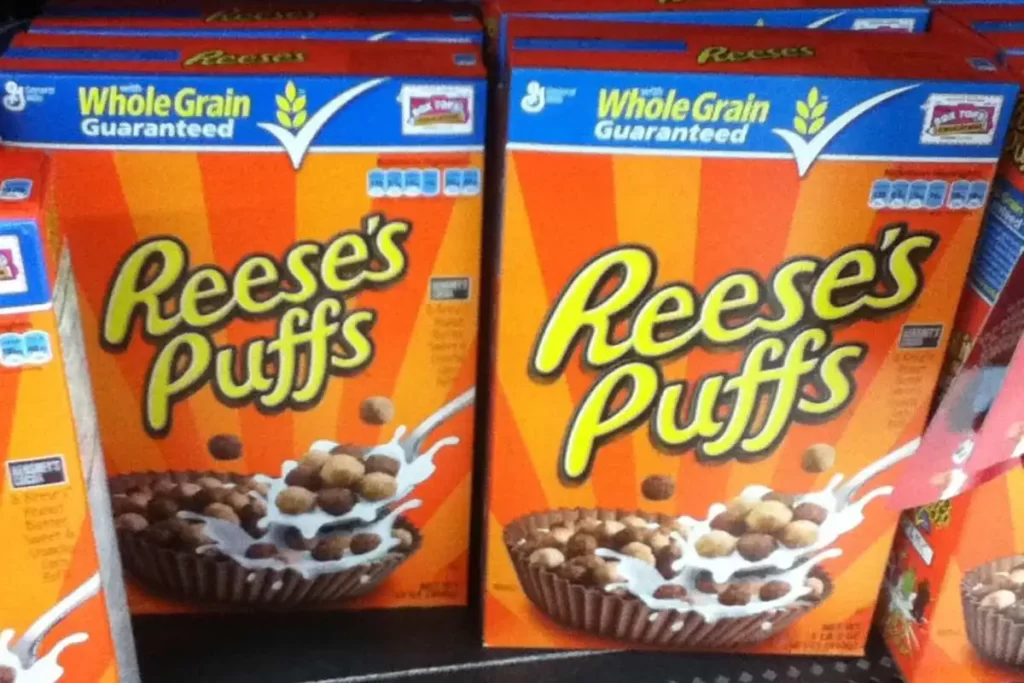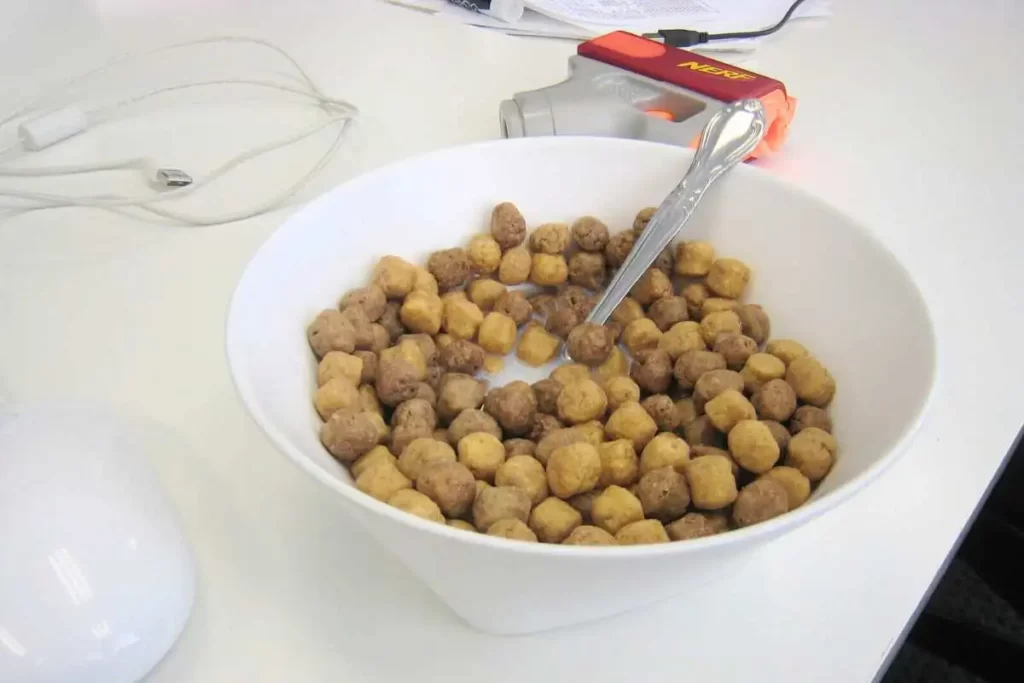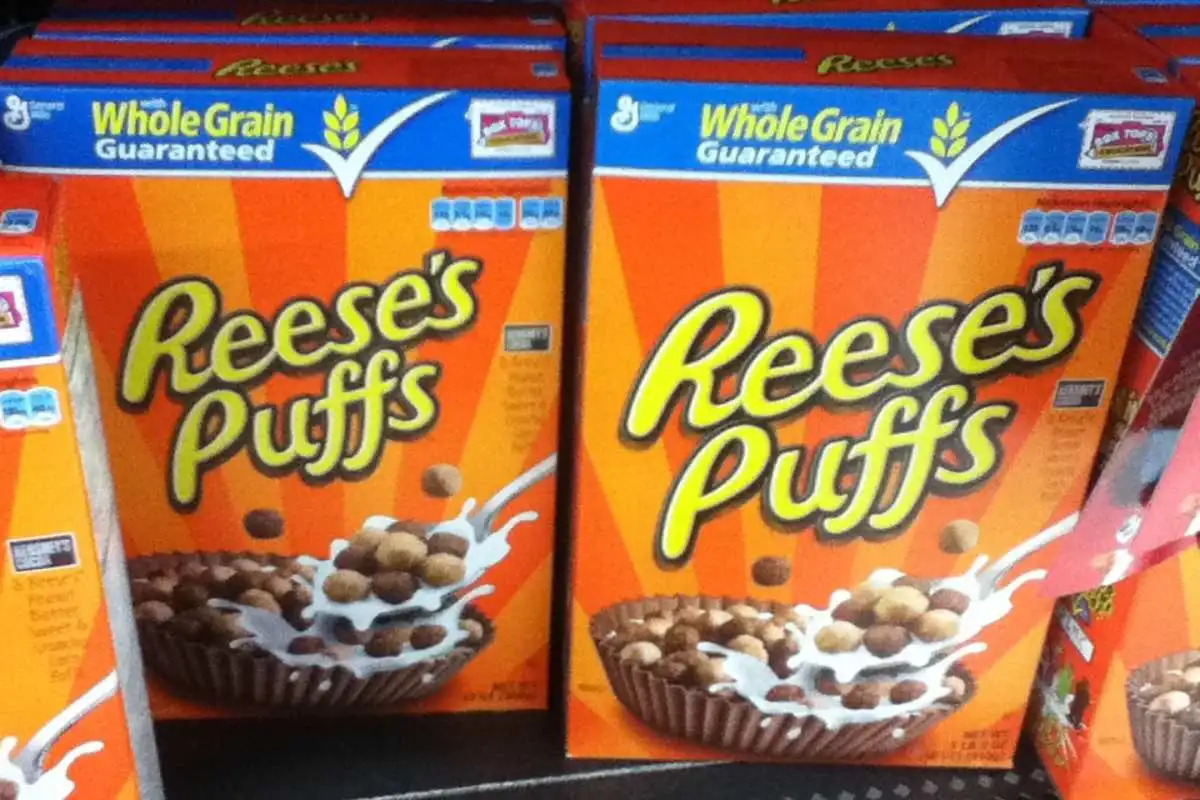In an era where gluten-consciousness is paramount, choosing the right foods is a critical consideration. Enter Reese’s Puffs, General Mills’ iconic blend of chocolate and peanut butter flavors, served up in cereal form.
The question on many minds: “Are Reese’s Puffs gluten-free?” This guide delves into the cereal’s ingredients, manufacturing practices, and potential cross-contamination risks.
From understanding gluten’s impact to exploring the health benefits and side effects, we equip you with the knowledge to make an informed decision.
Whether driven by dietary needs or sheer curiosity, join us on this quest to uncover the gluten-free status of Reese’s Puffs.
Table of Contents
What is a Gluten-Free Diet?
A gluten-free diet is a dietary regimen that excludes the protein gluten. As mentioned earlier, gluten is found in wheat, rye, and barley, and can also be present in oats if they have been cross-contaminated.
People adopt a gluten-free diet for various reasons, the most common being celiac disease, gluten sensitivity, and wheat allergy.
Celiac Disease:
Celiac disease is an autoimmune disorder triggered by the consumption of gluten.
When individuals with celiac disease ingest gluten, it leads to damage in the small intestine, resulting in a range of symptoms and potential long-term health complications.
Adhering strictly to a gluten-free diet is the only effective treatment for managing celiac disease.
Gluten Sensitivity:
Unlike celiac disease, gluten sensitivity does not involve an autoimmune response.
However, individuals with gluten sensitivity experience similar symptoms to those with celiac disease, such as digestive issues, headaches, and fatigue.
While not as severe as celiac disease, avoiding gluten is still essential for those with gluten sensitivity.
Wheat Allergy:
A wheat allergy is an immune response to proteins found in wheat, rather than specifically to gluten. Symptoms can include hives, difficulty breathing, and digestive problems.
It’s important for individuals with a wheat allergy to avoid wheat-containing products, including those with gluten.
Read: Whataburger Gluten-Free: Do They Have Dedicated Options?
What is Reese’s Puffs?

Reese’s Puffs is a popular breakfast cereal produced by General Mills, known for its distinctive combination of flavors.
This cereal is a favorite among both children and adults for its unique blend of chocolate and peanut butter. The puffs themselves are made from whole grain corn, which provides a satisfying crunch.
The Flavorful Fusion:
The key to Reese’s Puffs’ popularity lies in its delicious chocolate-peanut butter flavoring.
This combination creates a taste reminiscent of the iconic Reese’s Peanut Butter Cups candy, which has a dedicated fan base of its own.
The cereal offers a convenient and enjoyable way to savor these beloved flavors in a breakfast setting.
Ingredients of Reese’s Puffs:
The ingredients list of Reese’s Puffs includes:
- Whole grain corn
- Sugar
- Cornstarch
- Cocoa powder
- Peanut butter
- Salt
- Natural and artificial flavors
- Soy lecithin (an emulsifier)
- BHT (a preservative)
These components work together to create the distinctive taste and texture of Reese’s Puffs.
While none of these ingredients explicitly contain gluten, it’s important to consider potential cross-contamination risks, as we discussed earlier.
Versatility in Consumption:
Beyond being enjoyed with milk, creative individuals have found various ways to incorporate Reese’s Puffs into other culinary creations.
From using them as a topping for yogurt or ice cream to incorporating them into dessert recipes, the versatility of Reese’s Puffs extends beyond the breakfast bowl.
Are Reese’s Puffs Gluten-Free?

No, Reese’s Puffs are not considered gluten-free. According to the General Mills website, there is a risk of cross-contamination with wheat ingredients during the manufacturing process.
While the ingredients list does not explicitly contain gluten-containing components, the possibility of cross-contamination is an important factor to consider for individuals with gluten sensitivity or celiac disease.
Cross-Contamination Risks:
Cross-contamination occurs when gluten-free products come into contact with surfaces or equipment that have been used to process gluten-containing foods.
In the case of Reese’s Puffs, they are manufactured in facilities that also process cereals containing gluten.
Despite rigorous cleaning protocols, there is still a potential risk of trace amounts of gluten being present in the final product.
General Mills’ Efforts:
General Mills, the manufacturer of Reese’s Puffs, is committed to addressing the concerns of individuals with gluten sensitivities.
They have implemented a gluten-free labeling policy and have invested in dedicated gluten-free production lines for certain products.
Additionally, they participate in a program with the Gluten-Free Certification Organization (GFCO), which sets strict standards for gluten-free products.
Individual Sensitivity:
It’s important to recognize that individual tolerance to gluten varies. Some individuals with celiac disease or gluten sensitivity may be able to tolerate products labeled as “gluten-free” but with trace amounts of gluten due to cross-contamination.
However, others may have more severe reactions even to minute amounts of gluten.
Read: Is Velveeta Gluten Free? – Side Effects, Recipes & All.
Gluten-Free Alternatives to Reese’s Puffs
For individuals following a gluten-free diet, there are a variety of delicious and nutritious alternatives to Reese’s Puffs available on the market.
These options provide a safe and satisfying breakfast experience without compromising on taste or texture. Here are some popular gluten-free cereal alternatives:
1. Envirokidz Panda Puffs:
Envirokidz Panda Puffs are made from organic ingredients and are gluten-free certified by the Gluten-Free Certification Organization (GFCO).
These puffs offer a light and airy texture with a hint of sweetness, making them a delightful morning option.
2. Envirokidz Gorilla Munch:
Another offering from Envirokidz, Gorilla Munch is a gluten-free cereal option made from organic cornmeal. It’s a crunchy and flavorful choice for those seeking a gluten-free alternative to traditional cereals.
3. Barbara’s Peanut Butter Puffins:
Barbara’s Peanut Butter Puffins are a gluten-free take on the classic puff cereal. Made with simple and wholesome ingredients, these puffs are flavored with real peanut butter for a satisfying taste.
4. Cascadian Farm Gluten-Free Peanut Butter Puffs:
Cascadian Farm offers a gluten-free peanut butter cereal that’s both organic and delicious. These puffs are made with whole grain corn and provide a satisfying crunch with a natural peanut butter flavor.
5. Nature’s Path Gluten Free Peanut Butter Puffs:
Nature’s Path offers a gluten-free alternative with their Peanut Butter Puffs. Made with organic ingredients, these puffs are free from artificial additives and provide a wholesome start to the day.
6. Rice Chex:
While not a traditional puff cereal, Rice Chex is a well-known gluten-free option. Made from whole grain rice, it offers a crispy and versatile base that can be enjoyed on its own or with added toppings.
7. Nature’s Path Mesa Sunrise:
For those seeking a diverse blend of flavors, Nature’s Path Mesa Sunrise is a gluten-free option that combines corn, flax, quinoa, and amaranth for a nutritious and tasty cereal experience.
These gluten-free alternatives offer a wide range of flavors and textures, ensuring that individuals with gluten sensitivity or celiac disease can still enjoy a satisfying breakfast without compromising their dietary needs. It’s important to check labels and certifications to ensure that products meet specific gluten-free standards.
Read: Is Twisted Tea Gluten Free?
Possible Health Benefits of Reese’s Puffs
While Reese’s Puffs may be a tasty treat, it’s important to acknowledge that, like many cereals, they are primarily a source of carbohydrates and sugars.
However, there are some nutritional components to consider:
1. Whole Grain Corn:
- Reese’s Puffs contain whole grain corn as a primary ingredient. Whole grains are a good source of fiber, which can aid in digestion and help maintain a feeling of fullness.
2. Vitamins and Minerals:
- Like many breakfast cereals, Reese’s Puffs are often fortified with essential vitamins and minerals. These can include B vitamins like folic acid, which is important for cell division and growth.
3. Peanut Butter Content:
- The inclusion of peanut butter in Reese’s Puffs provides a source of protein and healthy fats. Peanut butter is also a source of important nutrients like vitamin E, magnesium, and potassium.
4. Tocopherols:
- Tocopherols are a type of vitamin E and act as antioxidants, which help protect cells from damage.
5. Moderation and Enjoyment:
- While Reese’s Puffs may not be considered a health food, it’s important to remember that a balanced diet includes room for indulgence. Enjoying a bowl of Reese’s Puffs in moderation can be part of an overall healthy eating pattern.
6. Mental Well-Being:
- For some individuals, enjoying a favorite cereal like Reese’s Puffs can contribute to positive mental well-being. The pleasure derived from comfort foods can be an important aspect of overall health.
It’s important to note that while Reese’s Puffs do contain some beneficial nutrients, they should be consumed in moderation alongside a well-rounded diet. Additionally, individuals with specific dietary needs, such as gluten sensitivity or celiac disease, should exercise caution and consider gluten-free alternatives.
Read: Is Jack Daniels Gluten Free?
Potential Side Effects of Reese’s Puffs
While Reese’s Puffs can be a delicious and convenient breakfast option, it’s important to be aware of potential side effects, particularly for individuals with specific dietary needs or health concerns.
Here are some considerations to keep in mind:
1. High Sugar Content:
Reese’s Puffs, like many cereals, can be high in sugar. Consuming high amounts of added sugars can lead to spikes and crashes in blood sugar levels, which may contribute to feelings of fatigue and irritability.
2. Refined Carbohydrates:
The primary ingredient in Reese’s Puffs is cornmeal, which is a refined grain. Refined grains lack the fiber and nutrients found in whole grains, potentially leading to quicker digestion and less sustained energy.
3. Limited Nutrient Density:
While Reese’s Puffs may be fortified with vitamins and minerals, they still fall short of the nutrient density found in whole, minimally processed foods. Relying heavily on cereals for nutrition may lead to deficiencies in other essential nutrients.
4. Potential Allergens:
Reese’s Puffs contain ingredients like peanut butter and soy lecithin. For individuals with allergies to peanuts or soy, consuming this cereal can lead to allergic reactions.
5. Gluten Content:
As mentioned earlier, Reese’s Puffs are not considered gluten-free. For individuals with celiac disease or gluten sensitivity, consuming this cereal poses a risk of triggering adverse reactions.
6. Dental Health:
Like many sweet cereals, Reese’s Puffs can contribute to dental issues, especially if consumed frequently. The high sugar content can increase the risk of tooth decay.
7. Moderation is Key:
Enjoying Reese’s Puffs in moderation as part of a balanced diet is the key to minimizing potential side effects. It’s important to complement cereal consumption with a variety of nutrient-dense foods.
8. Consider Gluten-Free Alternatives:
For individuals with gluten sensitivity or celiac disease, exploring gluten-free alternatives can be a safer option. This ensures that potential side effects related to gluten consumption are avoided.
While Reese’s Puffs can be a tasty part of a balanced diet, it’s important to be mindful of their nutritional profile and potential effects on health. Making informed choices about cereal consumption, along with incorporating a variety of nutrient-dense foods, is crucial for overall well-being. For those with specific dietary needs, seeking out gluten-free alternatives can provide a safer and equally enjoyable breakfast option.
Conclusion
So, are Reese’s Puffs gluten-free? As I mentioned earlier, Reese’s Puffs, while not containing explicit gluten ingredients, do come with a risk of cross-contamination during the manufacturing process. This poses a potential concern for individuals with celiac disease or gluten sensitivity.
It’s vital to recognize that personal tolerance to gluten varies. While some may tolerate trace amounts, others may experience adverse effects. Therefore, consulting a healthcare professional or registered dietitian with expertise in gluten-related conditions is crucial for tailored advice.
For those who need to avoid gluten, there is a wide array of certified gluten-free cereal alternatives available in the market. By being informed and discerning in our choices, we can enjoy a satisfying breakfast while prioritizing our health and well-being.
Reese’s Puffs may not be suitable for individuals with celiac disease or severe gluten sensitivity due to potential cross-contamination risks. Making thoughtful dietary choices based on individual needs and preferences is paramount. Let’s continue to explore and embrace the diverse world of gluten-free options available to us.
FAQs:
No, Reese’s Puffs Minis are not gluten-free. They contain whole grain wheat and barley malt extract, both of which are gluten-containing ingredients.
No, Reese’s products are not considered gluten-free. They contain ingredients, such as peanut butter, which may be cross-contaminated with gluten. Additionally, specific Reese’s products, like Reese’s Pieces Eggs and Reese’s Big Cup with Potato Chips King Size Peanut Butter Cups, may contain gluten-containing ingredients.
No, Reese’s Puffs are not dairy-free. They contain milk powder and whey powder, both of which are dairy ingredients.
No, Cocoa Puffs are not gluten-free. They contain whole grain wheat and barley malt extract, both of which are gluten-containing ingredients.

